- Austausch & Vernetzung
- Wissen & Lernen
- Advocacy
- Unsere Themen
Die Digitalisierung verändert die internationale Gesundheitszusammenarbeit und konfrontiert die Gesundheitssysteme mit grossen Herausforderungen, aber auch mit neuen Chancen und Potentialen. Das Netzwerk MMS sieht sich in der Verantwortung und engagiert sich in diesem Themenbereich. Entscheidende Fragen sind: Werden die digitalen Gesundheitstechnologien verantwortungsvoll und mit einer klaren Strategie eingesetzt? Wer hat Zugang zu diesen Technologien und wie können bereits bestehende Ungerechtigkeiten vermieden werden?
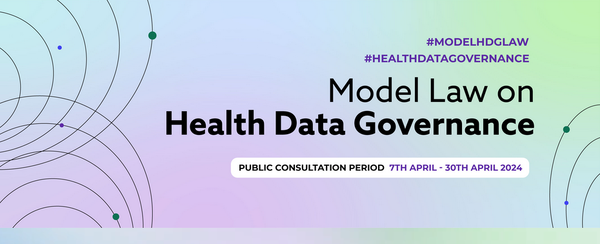
Public Consultation Period 7th - 30th April
"Transform Health and partners are convening a period of public consultation on a draft Model Law on Health Data Governance, which articulates core elements, guidance and model legal text, informed by equity and rights-based principles, among other international, regional and national commitments and best practice. The purpose of this consultation period is to gather stakeholder and expert feedback on the draft, including its content and how it is structured. Through this process, we aim to strengthen and validate the draft, while building consensus, alignment and broad support around the core elements."
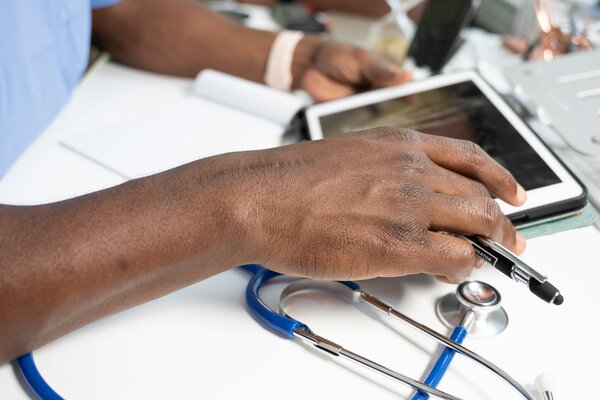
"The Global Initiative on Digital Health (GIDH) is a WHO managed network of stakeholders organized to facilitate the implementation of the Global Strategy on Digital Health 2020-2025 and other WHO norms and standards for Digital Health System Transformation. The Initiative will serve as a platform to enable a wide global ecosystem to work collectively to promote country capacity and strengthen international cooperation in digital health. GIDH will prioritize the following core areas of work: assessing and prioritizing Member States’ needs, evaluating the availability and reporting of country-level digital health resources and identifying under-funded priorities, supporting technically and financially the accelerated achievement of the strategic objectives defined in the Global Strategy on Digital Health 2020-2025, building capacity and converging efforts to encourage developing, maintaining and adapting digital health technologies to continuously changing needs."
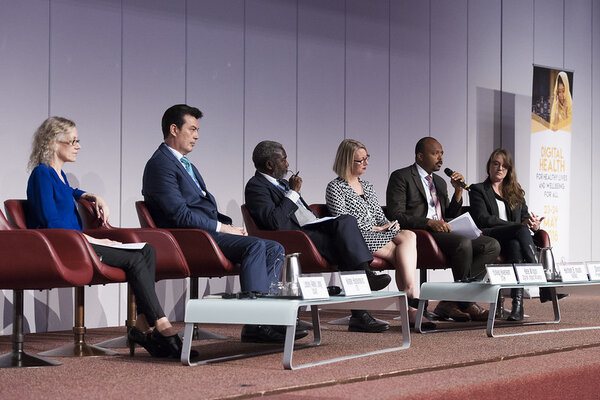
Policy brief
UNITE Parliamentarians Network for Global Health & Transform Health "Globally, more than half of the world population (about 4.5 billion people) lacks full access to essential health services. As a result, many will not meet their Universal Health Coverage commitments by 2030. Among other reasons, COVID-19 significantly delayed and harmed efforts towards Universal Health Coverage (UHC) leaving many countries off track to meet their commitments. However, it also accelerated the digitalisation of health systems. Health for all cannot be discussed without harnessing the transformative power of digital health. It is now recognised as a necessary component to achieve a more integrated health system and to achieve UHC by 2030."
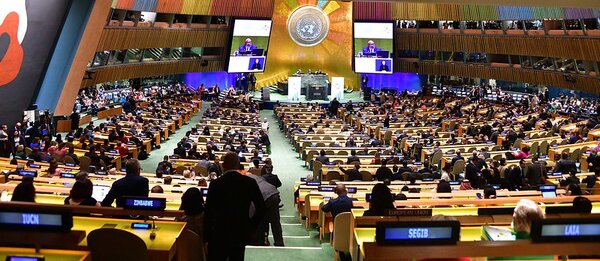
A call for digital health to be prioritised as a driver of UHC progress
"Transform Health was at #UNGA78! We organised a high-level discussion on ‘Optimising digital health investment to deliver Universal Health Coverage’ and participated in the high-level meetings on Pandemic, Prevention, Preparedness and Response and on Universal Health Coverage , alongside numerous other side events and meetings. Some highlights and reflections below! (...) As we approached this year’s UN General Assembly, we had a clear ask for governments and other stakeholders to make bold commitments to prioritise #DigitalHealth to deliver UHC by 2030. As we got closer to the UHC high-level meeting (UHCHLM), and the final draft of the Political Declaration was released, we responded with a joint-statement co-authored by 22 global leaders, calling for a more ambitious commitment that fully recognises the transformative potential of digital health as a key driver to accelerate progress towards UHC."

Introducing the Digital Transformations for Health Lab (DTH-Lab)
"In October 2021, the Lancet and Financial Times Commission on Governing Health Futures 2030: Growing up in a digital world published a report calling for stronger digital and data governance to improve young people’s health and well-being and support achievement of the Sustainable Development Goals. To continue the Commission’s work, and accelerate implementation of its recommendations, a global consortium called the Digital Transformations for Health Lab (DTH-Lab) has been established by many of the Commission’s original members and partners. (...) The DTH-Lab will continue the Commission’s portfolio of research and analysis whilst at the same time establishing partnerships with youth, policymakers, technology companies and other actors to co-design and test governance solutions, particularly in low and middle-income countries in Africa and Asia with large youth populations. It will achieve its goals through a multidisciplinary approach that combines cutting edge research, strengthening youth leadership, driving innovations in policy and practice, and shifting public and political agendas."
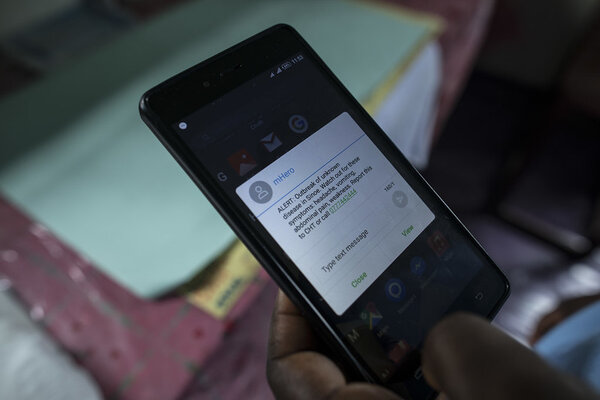
This is the first overview of systematic reviews to interpret the impact of digital health technologies on the competencies and performance of health-care workers
"A new WHO/Europe study published in The Lancet Digital Health shows that the use of mobile technologies, telemedicine and other digital tools intended to support clinical decisions have improved health workers’ performance and mental health, as well as their skills and competencies. The study, conducted globally, also warns that there are still gaps in the evaluation and impact of these technologies in lower- and middle-income countries."

New project funded by Fondation Botnar
"While they offer the opportunity to speed progress towards the Sustainable Development Goals, digital technologies and artificial intelligence are designed, accessed and used in a context shaped by profound inequalities, both among and within countries. UN leaders have affirmed that “human rights should be at the heart of tech governance”, and high-level policy discussions over the next few years could represent a turning point. Young people and civil society in low- and middle-income countries have had little voice in digital governance, but they must have a role in shaping those discussions, or risk missing the opportunity to establish rights-based digital governance for the future."

By Sara (Meg) Davis, Professor of Digital Health and Rights at University of Warwick and an Associated Researcher at the Geneva Graduate Institute
"At a critical moment in the global digital transformation, with media and world leaders debating whether artificial intelligence (AI) might pose a future existential threat to humans, are we talking enough about the harms already being done in the present? A new thematic report to the UN Human Rights Council from the UN Special Rapporteur on the Right of Everyone to the Highest Attainable Standard of Physical and Mental Health, Dr. Tlaleng Mofokeng, highlights the real-world threats we face in the ongoing spread of digital technologies in global health, some real benefits, and the urgent need for a broader public conversation about human rights and health in the digital age."
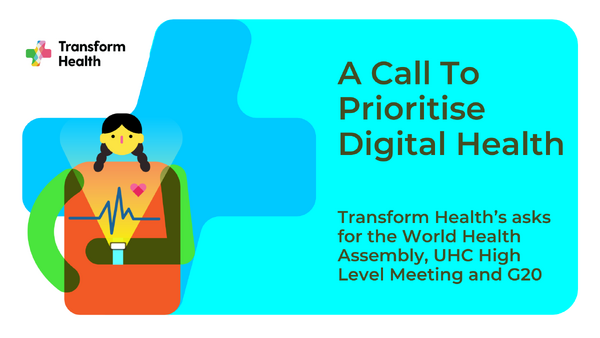
Transform Health’s asks for the World Health Assembly, UHC High Level Meeting and G20
"Digital health is already an important and growing part of most health systems. It offers a huge opportunity to accelerate progress towards achieving the Sustainable Development Goal of reaching Universal Health Coverage (UHC) by 2030. The equitable, inclusive and sustainable digital transformation of health systems can help scale up access to primary health care services, strengthen resilient health systems, close equity gaps to deliver health for all. Despite progress, many countries are not on track to achieve their UHC targets by 2030, with the COVID-19 pandemic having thrown many countries off course."
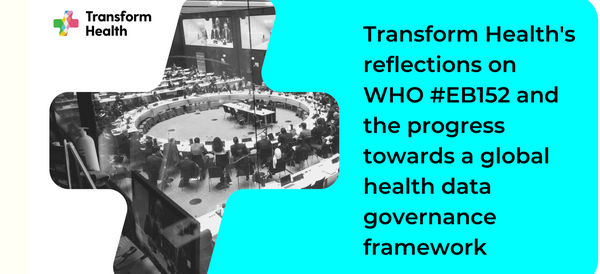
Transform Healths reflections on #EB152
Transform Health "The 152nd session of the WHO Executive Board meeting (#EB152) drew to a close this week, following a busy week of official proceedings, bilateral meetings and strengthening collaborations with global health partners. Transform Health is encouraged by the growing support for stronger health data governance and looks forward to building on this momentum as we look towards the 76th World Health Assembly (#WHA76) in May. As Member States met in Geneva for #EB152, Transform Health was calling for action on health data governance, including to ensure this is prioritised on the agenda of #WHA76 and to support a resolution, which would initiate the development of a global framework."

By Stefan German, Fondation Botnar
"Around the world, today’s cities are vibrant, metropolitan hubs, filled with buzzing food scenes, job and education opportunities, night life and so on. It is therefore no surprise that young people flock to these urban centres for new opportunities, connections and excitement. The pull of large urban areas has resulted in more people settling and bringing up children in cities – meaning that now 60% of rapidly growing city populations are projected to be less than 18 years old by 2030. While cities are places of opportunity and growth, from education to healthcare, to employment, our city systems are currently failing young people with increased exclusion and poverty in disadvantaged urban areas, damaging their health and well-being, and leaving them at risk of being left behind."
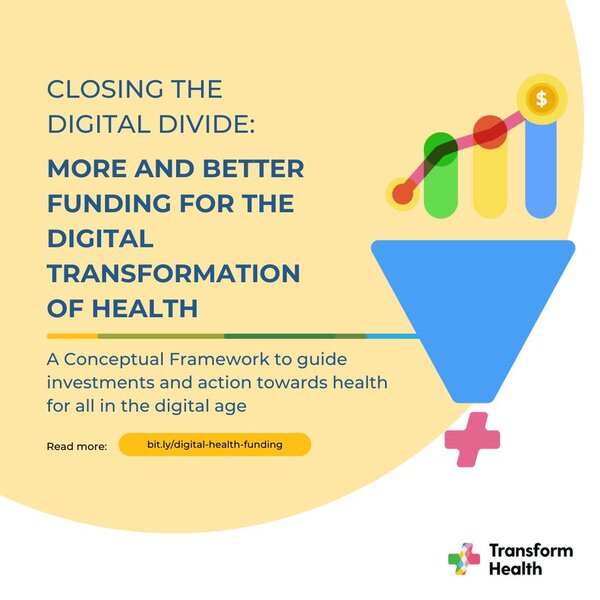
To guide this work, Transform Health has published a Conceptual Framework to guide investments and action towards health for all in the digital age.
"Closing the digital divide: More and better funding for the digital transformation of health’ frames the thinking on how to guide investments and action for digital health transformation in low and middle income countries. The report lays out six key recommendations for national governments, international donors, and the private sector to increase and improve investments towards building digitally-enabled health systems that improve health outcomes for all. This report has been developed by Transform Health, with the support of its partners PATH and Joep Lange Institute, and with research contributions from regional networks and the Young Experts: Tech 4 Health."

On international youth day (12 August) the GHFutures2030 Youth Network launched the #MyHealthFutures campaign, aimed at creating space for young people under 35 to share their hopes, concerns and ideas for improving health futures.
"The Governing Health Futures 2030 (GHFutures2030) Commission’s report outlines how digital technologies and data are transforming health and healthcare. The Commission observed that health systems in all regions of the world are becoming increasingly digital first. This means that rather than travelling to a health facility for a face-to-face consultation with a health worker, a patient can access a growing range of health services and health information through digital channels. From Rwanda to the United Kingdom, governments are aspiring to make digital first healthcare available to their whole populations. Digital tools and services such as virtual consultations with doctors, digital sensors and wearable technologies to monitor vital signs, and AI-assisted health information tools are becoming increasingly integrated. As they become the norm, it is likely that we will very soon stop talking about ‘digital’ health and ‘digital first’ health systems."
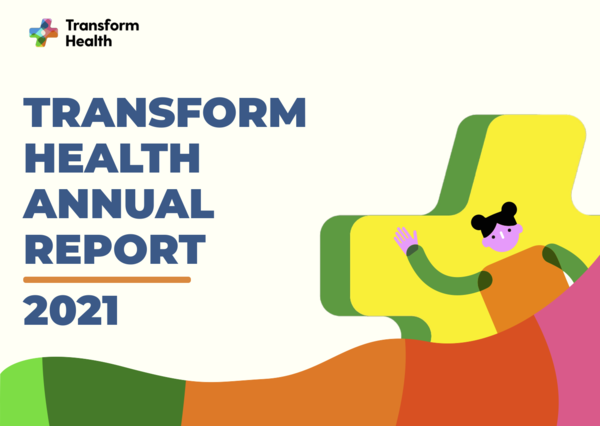
"2021 was a busy year for Transform Health. We formally announced the coalition and our commitment to work with partners to advocate for the enabling environment necessary to ensure the digital transformation of health systems. (...) We are proud to share the progress that we have made towards our three strategic objectives – building political will, advocating for a health data governance framework, and enabling increased and coordinated investments towards digital transformation – in this annual report."

"We present a comprehensive Framework for Digital Health Equity, detailing key digital determinants of health (DDoH), to support the work of digital health tool creators in industry, health systems operations, and academia. The rapid digitization of healthcare may widen health disparities if solutions are not developed with these determinants in mind. Our framework builds on the leading health disparities framework, incorporating a digital environment domain. We examine DDoHs at the individual, interpersonal, community, and societal levels, discuss the importance of a root cause, multi-level approach, and offer a pragmatic case study that applies our framework."
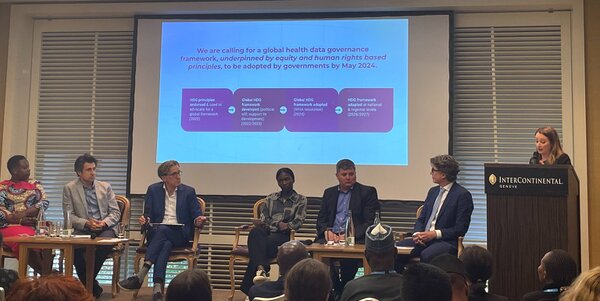
Transform Health at WHA75
"Another World Health Assembly (WHA) has come to an end. (...) Much more must be done to ensure inclusive and meaningful engagement from all parts of the world, including holding more of these meetings in low and lower-middle income countries and facilitating equitable participation. Transform Health went into the WHA with clear calls - for Member States to endorse a new set of equity and rights-based Health Data Governance Principles and to support the development of a global framework. These are critical milestones towards maximising the public value of health data whilst protecting individual rights, and important for Universal Health Coverage (UHC) progress and pandemic preparedness and response."
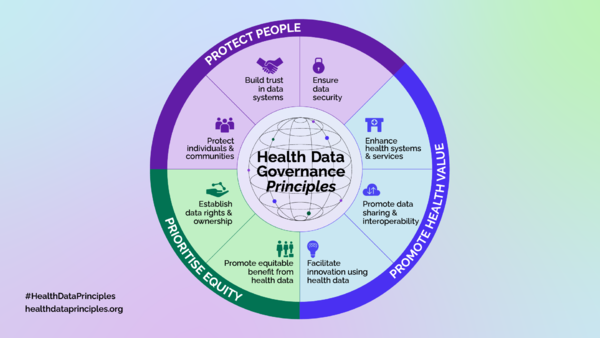
Press release 7 April 2022
On World Health Day, organisations around the world are shining a light on health data, with the launch of the Health Data Governance Principles – the first global set of principles to guide the use of data in health systems. They are grounded in human rights and equity, and oriented towards supporting resilient public health systems that can deliver health for all. With the rights of individuals and communities at their core, the Principles are clustered around three key objectives: protect people, promote health value, and prioritise equity. They create a common vision where all people and communities can share, use and benefit from health data.

Global Health Centre Senior Researcher Sara (Meg) Davis examines how tech companies mine global health data without our knowledge and the ensuing inequalities caused by these practices.
Graduate Institute Geneva - Global Health Centre "For many people, a mobile phone is the first thing we reach for to check medical symptoms, find a clinic, or look up medication side effects. But where does this intimate data go after we type it into the phone? Does it go to a foreign company, a government agency, or some third party? Do we really know what autonomy we give up when we “accept cookies”? In fact, most of us are not too sure, even as we become increasingly dependent on phones – and in fact, even when we think we have opted out of data sharing, we may be mistaken. The Covid-19 pandemic has accelerated the digital transformation, generating billions from personal data, but has also left most people in the dark about how our data is used. We are transparent to tech companies, but they are not transparent to us. To counter these and other epistemic inequalities in the digital transformation, we need new models of knowledge production that crack open this closed system, educating and empowering the public to advocate for rights-based digital governance."

New podcast episode of the Geneva Gub for Global Digital Health (www.gdhub.org)
"The #HealthDataPrinciples are the result of a global collaborative effort: over 200 digital health experts from 130 organisations around the world came together to develop these Principles in an inclusive, bottom-up process stewarded by Transform Health." These principles will launch on April 7th 2022, but you can already learn more about these in this #gdhub episode: Kirsten Mathieson, Policy Lead at ,Transform Health, is providing insights into the development of the ‘Health Data Governance Principals’, a set of globally unifying, human rights-based Health Data Governance Principles that can provide a common vision for health data governance. Hosted by Cléo Schwerzmann (gdhub)."

Transform Health "The International Federation of Medical Students’ Associations (IFMSA) and Transform Health welcome the inclusion of digital health in the final Declaration of the Health Workforce Conference 2022, held between 07 and 09 February in Nairobi, Kenya. The education and training needs of the health workforce are critical in delivering quality care and responding to the health needs of the population. Those students coming through the education and training systems at the moment will be the frontline staff delivering healthcare during the decades to come and therefore vital to ensuring governments are able to achieve their universal health coverage commitments."
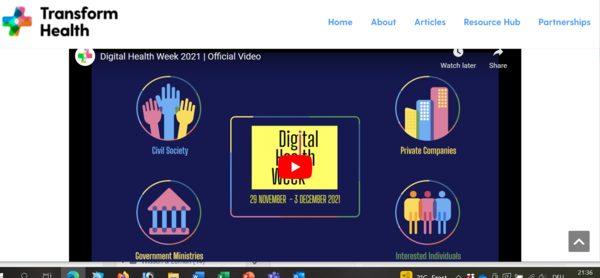
Transform Health "With the United Nations goal of achieving Universal Health Coverage by 2030 less than eight years away, the role of digital technologies in accelerating progress towards providing quality healthcare – by improving the accessibility, affordability, quality and reach of health systems – has assumed fresh importance and is rising up the political agenda.. COVID-19 showed us how digital health – including open and transparent data sharing, telemedicine appointments and the use of other digital tools – could enhance health outcomes. (...) From November 29 to December 3, 2021, over 70 organisations, across 40 countries, from Guatemala to the Philippines, came together to discuss the challenges and opportunities offered by digital health. The first global Digital Health Week, organised by Transform Health, was a resounding success!"

Transform Health und seine Partner:innen rufen den WHO Executivrat dazu auf, die globale Vewaltung von Gesundheitsdaten an der 75. Weltgesundheitsversammlung im Mai 2022 als Tagesordnungspunkt zu verhandeln. Für die internationale Zusammenarbeit bedarf es global gültiger Rechtsvorschriften, um den Austausch von Daten zu ermöglichen. Die Governance von Gesundheitsdaten muss auf den Grundsätzen von Gleichheit und Menschenrechten beruhen, so die Forderung. Regierungen müssen sicherstellen, dass alle Menschen gleichermassen von der Erhebung von Gesundheitsdaten profitieren.

While COVID- 19 has taken a physical toll, in the number of deaths, the impact on mental health, remains relatively overlooked
"The COVID-19 pandemic has led to disastrous socio-economic implications. To understand the impact of the pandemic on various aspects and highlight the centrality of mental health in an individual’s life ETI and PATH collaborated to release a white-paper series ‘Breaking the Barriers: Pathways to addressing mental health and long-COVID impact in India. (...) This whitepaper series, developed in collaboration with national and international experts from different fields, attempts to highlight the impact of the pandemic on various aspects of life, the ensuing mental health crisis, and initiate a discussion on the way forward to address this. We hope this series will highlight the centrality of mental health in human life, and the urgent need to view mental health holistically, addressing not only the symptoms, but also the underlying factors in a comprehensive and sustainable manner across the country."

New special report including 37 articles
"In this joint commission from The Lancet and Financial Times on Governing Health Futures 2030, we explore how AI and other digital advancements are being harnessed to improve healthcare in the world’s poorest regions. - Read among others about how "Uganda tackles diseases with a phone call" or about "Five ways AI can democratise African healthcare"."

British Medical Journal (bmj) "Integrating human rights across the lifecycle of digital health technology will increase accountability for any of its discriminatory impacts, argue Rachael Hinton, Ulla Jasper, and Siddhartha Jha. Digital technology that depends on data and artificial intelligence (AI) is becoming a key resource for innovation and development to address healthcare challenges. However, some commentators have warned that a technocratic approach to digital technology in healthcare, which ignores the broader political, sociocultural, and economic context, will reinforce or introduce new threats to human rights."

Transform Health Transform Health, Fondation Botnar, the Civil Society Engagement Mechanism for UHC2030 and Medicus Mundi Switzerland hosted a hybrid event during Digital Health Week to build political momentum for action and investment in digitally-enabled primary healthcare to close the digital health equity gap and accelerate progress to achieve UHC. The event brought together government representatives, international organizations, civil society, youth representatives, and industry to hear diverse stakeholder perspectives and commitments to make progress on this agenda. The event featured the launch of a new report by Transform Health, “The case for digital health: Accelerating progress to achieve UHC”.
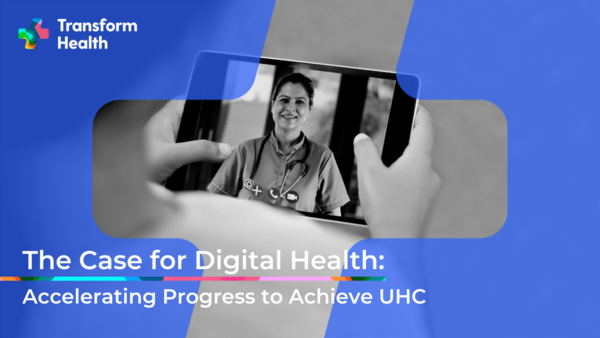
Neuer Bericht von Transform Health: "The Case For Digital Health: Accelerating Progress to Achieve UHC"
Eine allgemeine Gesundheitsversorgung (Universal Health Coverage) ist noch immer für die Hälfte der Menschheit, vor allem in den Ländern mit niedrigem und mittlerem Einkommen nicht gewährleistet. Es wird daher dringend empfohlen, innovative Ansätze wie sie durch die Digitalisierung im Gesundheitswesen mittlerweile zur Verfügung stehen, auch im globalen Süden zu implementieren. Obwohl heute fast weltweit ein digitales Breitbandnetz zur Verfügung steht, haben viele Regierungen dieses Potential noch zu wenig erkannt und in den primären Gesundheitseinrichtungen umgesetzt. Im digitalen Zeitalter ist die digitale Transformation in der Gesundheitsversorgung jedoch unumgänglich. Transform Health empfiehlt mehrere Massnahmen, um eine solche Transformation zu erreichen.
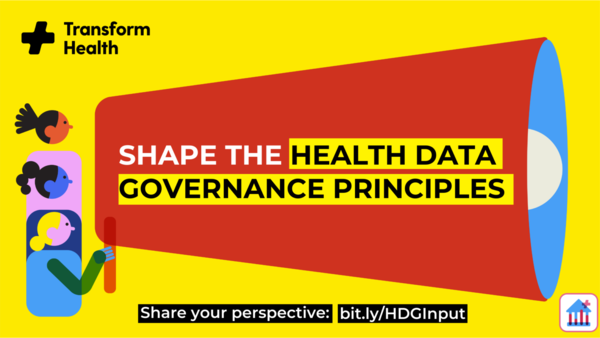
Transform Health invites feedback on a set of Health Data Governance Principles. The public consultation period will run from October 27th until December 3rd.
"Together with partners, Transform Health has been stewarding the development of a set of representative and human rights-based Health Data Governance Principles. Grounded in UHC, the Principles bring a human rights and equity lens to digital health, and are oriented toward supporting sustainable and resilient public health systems. (...) The current draft of the Principles has been developed and driven by civil society through an inclusive and consultative process. Seven global and regional consultations have already been carried out to gather perspectives and expertise from across geographies, sectors and stakeholders. This public consultation will allow the Principles to be further refined, supported, and endorsed by an even wider audience."

New report: How can we support the health and wellbeing of young people growing up in a digital world?
The Lancet "The Lancet "From the short-term and long-term effects of the COVID-19 pandemic to the health insecurities brought about by climate change, health futures are unfolding in an era of accelerating economic, societal, technological, and environmental changes. Digital transformations, which we define as the multifaceted processes of integration of digital technologies and platforms into all areas of life, including health, are central to understanding—and shaping—many of these disruptive dynamics. Because large gaps remain in the current evidence base on the interface of digital technologies and health, taking a precautionary, mission-oriented, and value-based approach to its governance is crucial."

A Participatory Action Research Project
"In the past two decades, digital health interventions have become increasingly widespread globally, with the aim of broadening access to and improving quality of health services, while empowering people to have greater control of their health and well-being. However, in the Global South, structural and systemic factors (racism, gender inequality, socio-economic inequalities, and other underlying social determinants of health) affect access to health services and information, and this extends to digital health: only 35% of people are connected to the internet. The COVID-19 pandemic has made it even more apparent that internet access is becoming a basic need, and meeting that need will require strengthened Information and Communications Technology (ICT) regulatory systems and investments that center community needs."

Author: Akarsh Venkatasubramanian (@Akarshtweets), Transform Health Data Governance Advisor. Written with inputs from Anna Volbrecht-Shaw, Louise Holly, Frank D. Smith and Parminder Jeet Singh.
"As the World Health Organization brings together experts for a Health Data Governance summit (June 30th), and as health leaders consider the inclusion of digital technology at the World Health Assembly and at the G7, governance of digital technologies, data and artificial intelligence (AI) has never before seen the level of priority and attention, particularly in the wake of COVID-19. Transform Health takes the opportunity to continue reflecting on this critical issue by making the case for stronger global health data governance to close the digital divide and invest in digitally-enabled health systems, particularly for the most vulnerable such as women, children and adolescents."

MMS Bulletin #157, März 2021
MMS Die Digitalisierung betrifft uns alle. Die Geschwindigkeit und das Ausmass der Veränderungen nehmen zu - was bedeutet, dass Kooperations- und Steuerungsmechanismen angepasst und neue Wege der Zusammenarbeit und Konsensfindung entwickelt werden müssen. Die erfolgreiche Nutzung der Chancen, die die Digitalisierung bietet, geht einher mit negativen Berichten über Menschenrechtsverletzungen, Ungerechtigkeiten und weiteren unbeabsichtigten Konsequenzen. Eine unreflektierte Umsetzung von digitalen Gesundheitstechnologien beinhaltet die Gefahr, Machtungleichgewichte und Ungleichheiten im Gesundheitsbereich zu vertiefen, insbesondere innerhalb und zwischen Ländern mit niedrigem und hohem Einkommen. In diesem Bulletin lesen Sie, wie das MMS Netzwerk am Symposium im November 2020 über notwendige globale Gouvernanz-Mechanismen diskutierte und welche Massnahmen entscheidend sind, um die Digitalisierung global in den Gesundheitssystemen sensibel und verantwortungsvoll unter Einbezug der Bevölkerung und unter Berücksichtigung von lokalen Gegebenheiten umzusetzen.

Health in the Digital Age – A New Era for Global Health?
MMS It was a great pleasure to organise and host this very special edition of the MMS Symposium 2020! Thanks to everyone who contributed to this event and made it a special day. Check out the presentations and ressources.

Novartis Foundation In der Umsetzung einiger digitaler Technologien, wie z.B. dem E-Banking über das mobile Telefon waren einkommensschwache Länder deutlich schneller als Länder mit hohem Einkommen. Ein ähnlicher Trend lässt sich jetzt auch für die Implementierung digitaler Technologien in die Gesundheitssysteme dieser Länder feststellen, wie ein aktueller Bericht unter Leitung der Novartis Foundation und Microsoft aufzeigt.
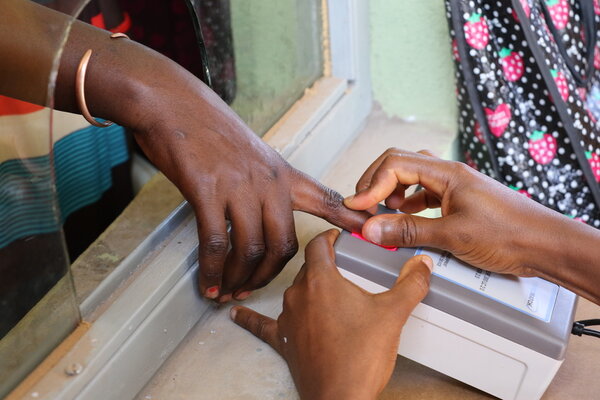
MMS Nachrichten Oktober 2020
MMS Die Digitalisierung betrifft uns alle. Telemedizin, webbasierte Diagnosetools, digitale Datenerfassung und künstliche Intelligenz (KI), um nur einige zu nennen, haben vielfältige Auswirkungen auf die Gesundheit sowie auf die Gesundheitssysteme und werden die Landschaft der globalen Gesundheit nachhaltig verändern. (Photo: EU Civil Protection and Humanitarian Aid/flickr, CC BY-NC-ND 2.0)

MMS Nachrichten September 2020
MMS Die Digitalisierung im Gesundheitsbereich schreitet voran. Ein eben erschienener Bericht von Medicus Mundi Schweiz zeigt, wo die internationale Gesundheitszusammenarbeit der Schweiz steht. Aufbauend auf diesen Bericht entwickelt MMS nun Grundlagen für eine ethische Umsetzung digitaler Projekte. (Foto: Digital Health Forum, 7. September 2020, Bern, MMS)

Med in Switzerland #22 September 2020
MMS Medicus Mundi Schweiz analysierte, wie und inwieweit seine Mitgliedsorganisationen digitale Technologien in der internationalen Gesundheitszusammenarbeit einsetzen. Die Umfrage ergab, dass gute Ansätze und Wissen in einigen Organisationen vorhanden sind. Um jedoch diese Technologien so einzusetzen, dass die Gesundheitsversorgung aller verbessert werden kann, sind Strategien notwendig, welche auf lokalen Kapazitäten und einer ethisch verantwortungsvollen Umsetzung basieren, schreibt die MMS-Projektleiterin Carine Weiss. (Photo by Lukas Blazek on Unsplash)

Report written by Carine Weiss, Medicus Mundi Switzerland
MMS This report reveals the results of the mapping exercise undertaken by MMS of its members’ use of digital technologies in health. The aim of the survey was to assess the knowledge and use of digital health technologies and to facilitate and foster collaboration between MMS member organisations. In short, it was designed to obtain a better understanding of who is doing what, how and where. (Photo by William Iven on Unsplash)

MMS Nachrichten August 2020
MMS Digitale Gesundheitstechnologien haben ein grosses Potential, um die gesundheitliche Situation auch in abgelegenen Weltregionen zu verbessern. Sie können aber auch globale Ungleichheit zementieren. Mit einem Framework möchte MMS dem begegnen. (Foto: Photo by Kai Pilger on Unsplash)
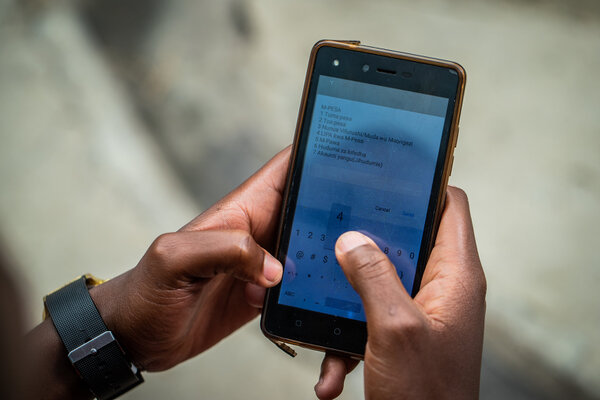
MMS Nachrichten Mai 2020
MMS Von der Arbeit bis zur Bildung, vom Konsum bis zu unserem Sozialleben: Wir werden durch diese Pandemie von einer Digitalisierungswelle davon getragen. Die globale Politik ist gefordert, einen nachhaltigen Rahmen zu definieren. (Foto: USAID Digital Development/flickr, CC BY 2.0)
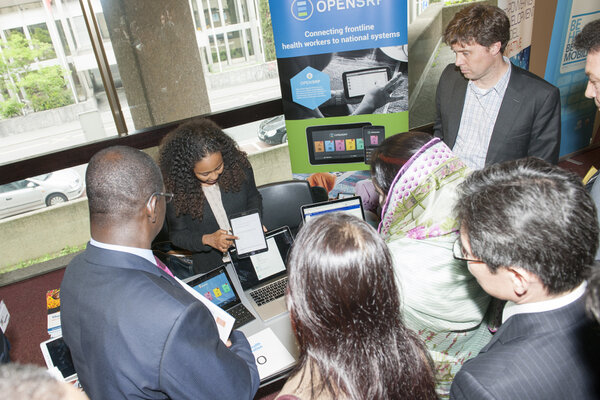
Die Digitalisierung verändert die internationale Zusammenarbeit – gerade auch im Gesundheitsbereich
Netzwerk Medicus Mundi Schweiz Was will Medicus Mundi Schweiz erreichen? Als Netzwerk von rund 50 Schweizer Organisationen und Institutionen, die in der internationalen Gesundheitszusammenarbeit und globalen Gesundheit tätig sind, sehen wir uns in der Verantwortung. Weil es uns um das Recht auf Gesundheit für alle weltweit geht, engagieren wir uns im Themenbereich der digitalen Gesundheit in der internationalen Zusammenarbeit mit folgendem Ziel: Schweizer Organisationen und Institutionen, die in der internationalen Gesundheitszusammenarbeit tätig sind, setzen digitale Gesundheitstechnologien verantwortungsvoll und mit einer klaren Strategie ein. (Foto: High-Level Policy Dialogue on Digital Health/ITU Pictures/flickr, CC BY 2.0)

MMS Nachrichten Januar 2020
MMS Die Digitalisierung verändert die internationale Zusammenarbeit – gerade auch im Gesundheitsbereich. Eine kritische Auseinandersetzung mit den Chancen und Risiken der Digitalisierung im Gesundheitsbereich tut not. (Photo: USAID Digital Development/flickr, CC BY 2.0)

MMS Bulletin #148, Dezember 2018
MMS Die Digitalisierung im Gesundheitswesen (eHealth) ist in vollem Gange. Sowohl im reichen Norden als auch im globalen Süden boomt die Anwendung von Smartphones, Apps, Tablets, Telemedizin oder auch Drohnen (mHealth) und revolutioniert den medizinischen Alltag. Ob in Prävention, Gesundheitsförderung oder zur Unterstützung von Behandlungsprozessen, digitale Technologien werden in allen Bereichen eingesetzt. Besonders für Länder mit niedrigem und mittlerem Einkommen eröffnet sich ein enormes Potential, um Entwicklungshemmnisse auf dem Weg zu "Universal Health Coverage" schnell aufzuholen. Gleichzeitig birgt diese digitale Revolution, die in den letzten Jahren riesige Mengen an Daten und Informationen generierte, eine Vielzahl von Gefahren und Herausforderungen. Wie müssen die Technologien eingesetzt werden, um die Effizienz der Gesundheitssysteme zu verbessern? Wie kann verhindert werden, dass der Besitz von Daten neue Monopole erzeugt? Wie kann der Datenschutz und die Sicherheit persönlicher Daten gewährleistet werden? Neue Innovationen, Partnerschaften und Standards sind notwendig, damit vor allem auch die NutzerInnen von eHealth profitieren, darin sind sich die AutorInnen unserer MMS Bulletin Ausgabe einig. (Foto: Burkina Faso, © Olivier Girard/ Terre des hommes Foundation)